Survey: Americans love conspiracy theories, and that’s dangerous for everyone
By Matthew A. Baum, Katherine Ognyanova | May 11, 2022
 Extraterrestial Highway. Credit: Rachel. Accessed via Pixabay. Pixabay License. Free for commercial use.
Extraterrestial Highway. Credit: Rachel. Accessed via Pixabay. Pixabay License. Free for commercial use.
A segment of the American population has long embraced conspiratorial thinking. False beliefs about moon landings or space aliens may seem as innocuous as they are outlandish. Yet, they may be close cousins to potentially far more damaging misperceptions that threaten to undermine the nation’s capacity to respond to urgent national or global emergencies.
America’s conspiratorial thinkers appear to have stood ready to accept false claims on such seemingly unrelated issues as the COVID-19 vaccine and the war in Ukraine, according to our ongoing research in the COVID States Project. In an era of heightened political polarization, conspiratorial thinking by even a relatively small segment of the public, especially when disproportionately aligned with one political party, could have outsized and potentially catastrophic consequences for key policy initiatives aimed at responding to crises. Whether policies are aimed at containing the emergence of contagious virus variants or preventing a third world war, tsunamis of misinformation threaten to undermine the post-World War II global order.
In our recent survey of all 50 US states plus the District of Columbia, we asked respondents to assess the accuracy of eight widespread false claims. Four of those claims were about the COVID-19 vaccine, while the other four pertained to the war in Ukraine. We also queried respondents about their attitudes and behaviors regarding both crises.
The results contain both good and bad news. The good news is that in both cases, most Americans did not believe false claims about either crisis (see Figure 1). The bad news is that relatively large percentages of respondents were unsure about the accuracy of the false claims.
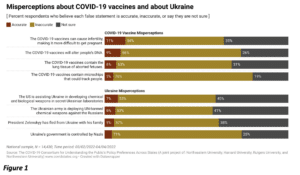
Beginning with the good news, belief in false claims about the COVID-19 vaccine ranged from a low of 5 percent who believed “the COVID-19 vaccine contains microchips that could track people” to a high of 11 percent who believed that “the COVID-19 vaccines can cause infertility, making it more difficult to get pregnant.” The percentages are a bit lower for Ukraine, ranging from a low of 4 percent who believed that “Ukraine’s government is controlled by Nazis” to a high of 7 percent who believed “the US is assisting Ukraine in developing chemical and biological weapons in secret Ukrainian laboratories.”
Overall, just under one in five Americans (18 percent) believed at least one of the four false claims about vaccines, while about one in seven (14 percent) believed at least one false claim about Ukraine (Figure 2).
It is distressing that any Americans believe these claims. Yet these numbers are not so different from the 11 percent who in 2019 reported “somewhat” or “strongly” believing that the US faked the Apollo moon landing. They are well below the 26 percent of Americans who in 2019 “somewhat” or “strongly” believed that the US government is housing aliens in Area 51 or the 36 percent of Americans who in 2007 believed 9/11 was an inside job perpetrated by the US government. There has always been a segment of the American public willing to entertain conspiracy theories, in most instances without harmful public policy consequences.
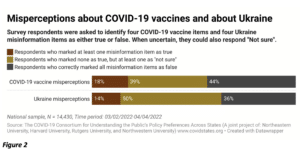
Turning to the bad news, much larger percentages of respondents were unsure about the accuracy of the individual false claims—far more than the 7 to 9 percent that expressed uncertainty about those other conspiracy theories. When uncertainty is added in, the overall percentages of respondents who either believed or were unsure about the various false claims surrounding the COVID-19 vaccine and war in Ukraine ranges from about one quarter to one-half of all respondents in each case (from 24 percent to 46 percent for COVID-19, and from 29 percent to 47 percent for Ukraine). Overall, half of all respondents believed or were unsure about at least one false claim about Ukraine; while the corresponding figure for the COVID-19 vaccine is 62 percent. Those are big numbers.
Even more concerning, misperceptions are linked to attitudes. In the case of COVID-19 vaccines (Figure 3), people who hold two or more misperceptions are over four times more likely than people with no misperceptions to indicate that they will not take the COVID-19 vaccine (60 percent vs. 13 percent).
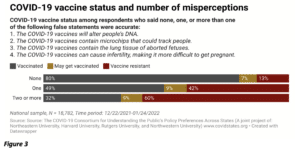
Holding misperceptions about Ukraine, in turn, strongly predicts warmer, more favorable feelings toward Russia and colder, less favorable feelings toward Ukraine. Respondents with no false beliefs about Ukraine report feeling 78 degrees warmer toward Ukraine than Russia on a 100-point “feeling thermometer” scale (Figure 4). The corresponding gap in feelings between Ukraine and Russia is less than half as wide in favor of Ukraine among respondents holding at least one false belief (+37 degrees).
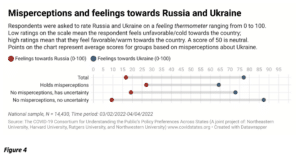
Our survey also suggests that many of the same people believe false claims about both crises. We considered a variety of socio-economic, demographic, and political factors that might influence people’s likelihood of believing false claims about Ukraine, including age, education, income, gender, region, geography, trust in government, and political party. Most had little or no effect. The exception is believing COVID-19 false claims (Figure 5). Compared to those with no vaccine misperceptions, people who believed at least one false claim about the COVID-19 vaccine were almost six times more likely to also hold at least one false belief about Ukraine (8 percent vs 45 percent).
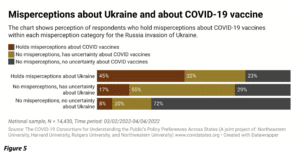
In fact, when we examined the association of demographic, geographic, and political factors with false beliefs about Ukraine, holding at least one COVID-19 vaccine misperception was about 10 times better at predicting Ukraine misperceptions than the next best predictor, trust in the government (Figure 6).
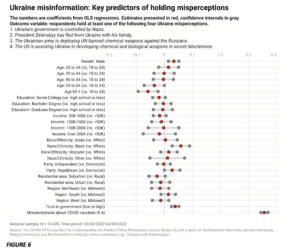 Attitudes and misperceptions about the two global crises are not uniformly distributed across the United States population. Notably, we find greater partisan polarization around beliefs in false claims about COVID-19 vaccines than around beliefs in false claims about Ukraine. False claims about Ukraine are accepted by 12 percent of Democrats and 17 percent of Republicans. In the case of COVID-19 vaccines, we see misperceptions among 11 percent of Democrats and 26 percent of Republicans. The partisan gap in misperceptions is three times larger for COVID-19 vaccines compared to the war in Ukraine (15 versus 5 percentage points). This arguably makes sense given the well-documented partisan polarization around COVID-19 and the relatively bipartisan support, to date, for US military aid to Ukraine.
Attitudes and misperceptions about the two global crises are not uniformly distributed across the United States population. Notably, we find greater partisan polarization around beliefs in false claims about COVID-19 vaccines than around beliefs in false claims about Ukraine. False claims about Ukraine are accepted by 12 percent of Democrats and 17 percent of Republicans. In the case of COVID-19 vaccines, we see misperceptions among 11 percent of Democrats and 26 percent of Republicans. The partisan gap in misperceptions is three times larger for COVID-19 vaccines compared to the war in Ukraine (15 versus 5 percentage points). This arguably makes sense given the well-documented partisan polarization around COVID-19 and the relatively bipartisan support, to date, for US military aid to Ukraine.
These patterns illustrate the complex policy challenge of responding to conspiratorial thinking. Playing whack-a-mole with individual false beliefs in particular may not be a successful strategy. We may instead need to address the underlying willingness to accept false claims in general. To borrow from the public health perspective, successful strategies need to address both the supply and the demand side of misinformation. Literacy campaigns, media interventions, technological, and regulatory solutions are all important aspects of a comprehensive approach aimed at mitigating the effects of misperceptions about important current issues.
Together, we make the world safer.
The Bulletin elevates expert voices above the noise. But as an independent nonprofit organization, our operations depend on the support of readers like you. Help us continue to deliver quality journalism that holds leaders accountable. Your support of our work at any level is important. In return, we promise our coverage will be understandable, influential, vigilant, solution-oriented, and fair-minded. Together we can make a difference.
Keywords: COVID-19, Ukraine, conspiracy theories, pandemic, public health, war
Topics: Biosecurity, Disruptive Technologies, Nuclear Risk, Nuclear Weapons
















By remarkable contrast, the Manhattan Project, with which we are now all familiar and which we celebrate as an amazing scientific achievement, met the definition of conspiracy dead-on. The black-budget funded Project was run by a select group of powerful and like-minded men. Its chief political characteristic, secrecy, has had lasting impact on democracy. The history was deliberately tailored to maintain that secrecy. Eighty years later, a nuclear history renaissance develops and a new story emerges, as we learn from the Smithsonian documentary, Atom Age Declassified. Still, we continue to debate Truman’s ‘decision’ to use the bomb but have yet… Read more »